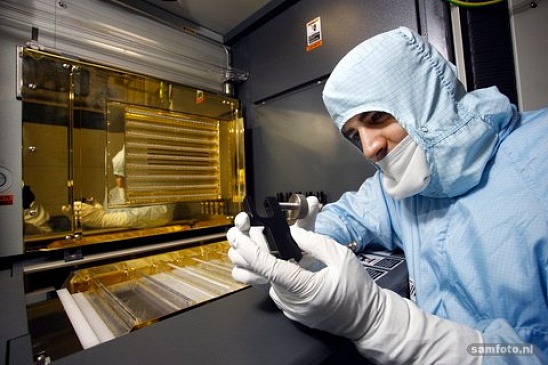Openings at ECTM
Postdoc: Next generation micro-assembly processes
Opening for: PostdocStatus details
| Status: | Closed |
|---|---|
| Announced: | 01 Nov 2021 |
| Duration: | 2 years |
The market for electronic chips remains increasing, electronic functionality is part of all devices and products around us. In the manufacturing of electronic packages, machines are used to assemble chips (pick-and-place, bond and interconnect). Although the performance of these machines is impressive, there is the need to further increase the speed by a factor of 10-100. At the same time, machines must become “green”: use less energy, and have a small ecological footprint. The bottleneck is in the mechanical part of the assembly machine.
In a large direct collaborative project with the Dutch company Nexperia we research new generations of chip assembly processes to achieve these goals.
The current position focuses on developing and testing the reliability of novel chip-to-substrate interconnect technologies. As a Post-doctoral researcher you will investigate, design, implement, and test innovative interconnection materials and solutions compatible with ultra-high throughput handling and accurate placement of chips. You will mechanically and electrically characterize these solutions, and design and build experimental setups to demonstrate that they can lead to breakthrough performance in next-generation chip assembly machines.
Requirements
You will be part of a team of 6 PhD and 2 postdoc researchers, that work together with staff scientists and engineers at TU Delft and the Dutch company Nexperia. Each of the researchers will work on a dedicated part of the project, while at the same time closely collaborating with the rest of the team to ensure all parts can eventually fit together to realize all steps that need to be performed in the chip-assembly process.
Candidates have a PhD degree in mechanical or mechatronic engineering, micro/nano engineering, engineering physics, or related fields. We are looking for candidates that can realize creative new solutions for dealing with the diverse challenges that accompany the accurate and fast manipulation of microchips, involving skills like experimental design, setup realization, electro-mechanical characterization, modeling, automation, use of diverse sensor systems and (high-speed) vision systems.
The collaboration both with a team of fellow researchers and with a high-tech company that is a world leader in its business will give you the unique opportunity to learn a lot and contribute to a next generation of machines that will improve the assembly speed and reduce the environmental impact of hundreds of billions of future chips.
Contact
dr. Massimo Mastrangeli
Associate Professor
Electronic Components, Technology and Materials Group
Department of Microelectronics
